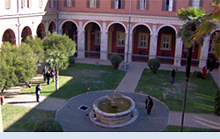 |
European Planetary Science Congress 2010
Angelicum Centre – Pontifical University of Saint Thomas Aquinas
19 – 24 September 2010, Rome, Italy |
 |
|
MG8 Electrodynamics of induced magnetospheres |
| Convener: Hermann Opgenoorth | Co-Convener: Mark Lester |
|
Oral Program
/ Wed, 22 Sep, 17:30–19:00
/ Room Lecture Room 2
Poster Program
/ Attendance Tue, 21 Sep, 17:30–19:00
/ Poster Area
|
The session deals with all aspects of the interaction of the upper atmospheres of planets and planet-like bodies without intrinsic magnetic field, but hosting atmospheres, and the surrounding plasma and magnetic field of either the sun or a host planet - i.e. we tentatively include the induced magnetospheres of Mars, Venus, Titan, Europa and possibly even comets), as most such bodies are embedded within a draped magnetic field of either the Solar wind or the host planet.
Variable conductivities in planetary ionospheres, which depend on solar illumination, plasma transport, and/or particle precipitation, together with convection, neutral winds and pressure gradients are considered to give rise to dynamic plasma interaction through currents and associated particle acceleration within the weak induced surrounding magnetosphere, coupling to both the outer medium of Solar wind or planetary host-magnetosphere, and the ionized upper atmosphere. The small and weak magnetosphere around such bodies will often itself be dynamically dependent on the conditions of the solar wind or the plasma environment surrounding the host planet. Some effects of these interactions, such as the expansion and contraction of the magnetosphere, will commonly occur on short timescales whilst others, for example planetary plasma loss to the solar wind, may determine the long-term evolution of planetary atmospheres. These interaction processes can be observed with the highest spatial and temporal resolution at Earth, while observations at other planets and moons show the application of these mechanisms to radically different scenarios. Therefore studies conducted at different examples throughout the solar system can, collectively, advance our knowledge of the fundamental physical processes.
We invite papers dealing with the physics of any such non-magnetised planet’s or giant-planet moon’s atmosphere interaction with the surrounding plasma. While we expect most of these papers to be strictly experimental, we particularly invite papers dealing with more general theoretical or modeling aspects of such interaction.

